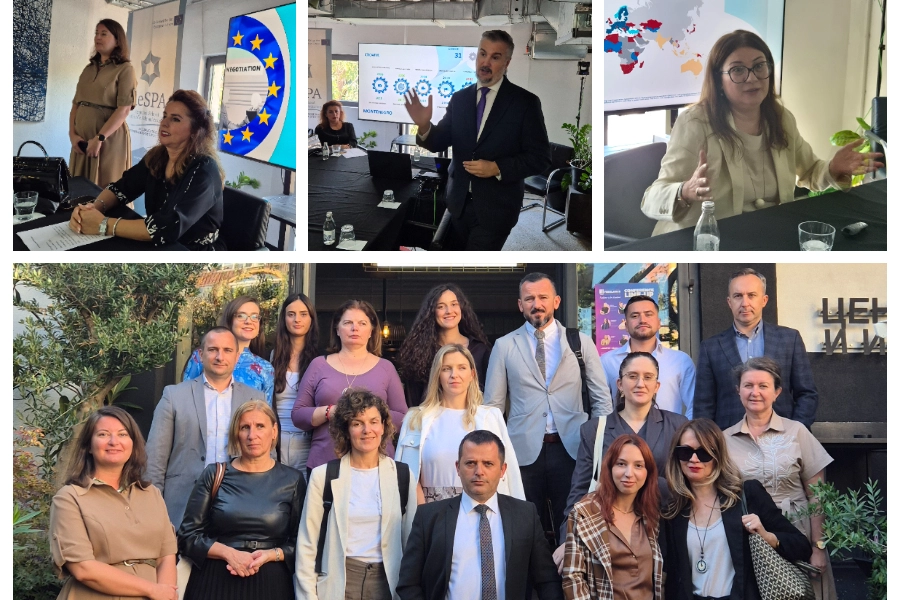
Training on Cluster 6 Strengthens Western Balkans’ Negotiation Capacities in EU External Relations and Security Policies
23–24 September 2025, Skopje, North Macedonia
ReSPA, gathered 20 civil servants from the Western Balkans for a two-day training module dedicated to Cluster 6 – External Relations of the EU accession negotiations, which includes Chapters 30 (External Relations) and 31 (Common Foreign, Security and Defence Policy), which are considered among the most complex and politically sensitive areas of the EU acquis.
Arlinda Gjakova, State Secretary at the Ministry of European Affairs of North Macedonia, underlined the EU’s strong commitment to the enlargement process and the importance of accelerating reforms in governance, rule of law, and economic integration.
Over the two days, distinguished experts provided in-depth analysis and practical guidance on negotiation challenges under Cluster 6:
Aleksandar Andrija Pejović, PhD, former chief negotiator and EU accession expert, presented the state of play of Western Balkan administrations per chapter, main challenges and obstacles candidates face in the chapters of Cluster 6, stressing that alignment in the fields of trade policy, foreign affairs, and security requires both technical expertise and strong political will.
Nataša Dragojlović, expert on Chapter 30, provided insights into the EU’s external relations legal and institutional framework, including trade, development, and humanitarian aid, the role of EEAS, and the European Commission (DG Trade, DG INTPA), as well as WTO alignment with EU MFN and FTA rules.
Tatjana Vinković from Croatia’s Directorate for Economy and Development Cooperation shared national experiences in EU trade policy, WTO, Free trade agreement with third countries, trade defence measures and highlighted the lessons learned from Croatia’s negotiation process.
Aleksandar Andrija Pejović, PhD, and Marija Vlajković, PhD (docent at the University of Belgrade), explored the EU’s sanctions and restrictive measures regimes, their legal architecture, humanitarian exemptions, and the Western Balkans angle in alignment and messaging with special emphasis on candidate states. A dynamic and interactive roleplay session allowed participants to simulate EU foreign policy decision-making by drafting declarations and resolutions on human-rights situations, strengthening their practical negotiation and drafting skills based on suggested scenarios of Africa and Africa/South America
Vladimir Ateljević, PhD (expert on Common Foreign and Security and Defence Policy), presented the EU’s civilian and military missions, stressing the opportunities for the Western Balkans to contribute and gain credibility in EU security structures.
Tamás Csiki Varga, PhD, Senior Research Fellow at Ludovika University, delivered an online lecture on the future of EU Common Security and Defence Policy, pointing to both institutional limitations and opportunities to use the momentum of a stronger European defence posture.
The training underlined several crucial conclusions:
- Strategic importance of Cluster 6: Alignment in external relations and security is not only a technical matter but also a political test of credibility and commitment for candidate states.
- Trade and sanctions alignment: Western Balkans administrations must prepare for the complexities of adopting the EU’s trade regime, which require legislative, institutional, and communication capacities.
- Regional cooperation as a driver: Peer learning and networking among Western Balkan administrations remain key to overcoming common negotiation challenges.
- Practical preparedness: Interactive exercises, such as the roleplay on CFSP declarations, proved essential for strengthening practical negotiation and policy-drafting skills.
- Forward-looking reforms in CSDP: Contributions to EU missions and security initiatives represent both an opportunity and a responsibility for candidate countries as part of their gradual integration into the EU’s foreign and security policy framework.
As part of the agenda, during the Thematic Group on EU Integration Meeting, participants discussed strategic priorities for 2026–2030 and pinpointed areas where ReSPA’s tailored support can make the biggest impact.
The training concluded with Jelisaveta Tasev, ReSPA Programme Manager, who highlighted that strengthening administrative capacities is essential for the Western Balkans to advance toward the successful negotiation and eventual closure of Cluster 6.



